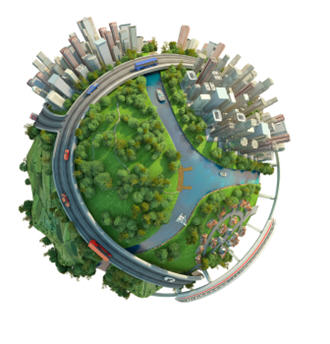
Green Space Can Make People Happier for Years
January 8, 2014—Nearly 10 years after the term "nature deficit disorder" entered the nation's vocabulary, research is showing for the first time that green space does appear to improve mental health in a sustained way. The report, which appears in the American Chemical Society (ACS) journal Environmental Science & Technology, gives urban park advocates another argument in support of their cause.
Mathew P. White and colleagues note that mental well-being is a major public health issue, with unipolar depressive disorder the leading cause of disability in middle- to high-income countries. Some research suggests that part of the blame for this unhappiness lies in increased urbanization—nearly 80 percent of the world's population in more developed regions live in city environments, which tend to have little room for nature. Other studies suggest a link between happiness and green space, but no research had convincingly established cause and effect of nature on well-being over time. To help fill that gap, White's team decided to examine the issue.
To figure out if nature makes people feel better in the long run, they compared the mental health of hundreds of people in the U.K. who went from a grey urban setting to a greener one with those who moved in the opposite direction. Mental health data showed that the people who moved to greener areas were happier during all three years that their health was tracked after relocating. "Moving to greener urban areas was associated with sustained mental health improvements, suggesting that environmental policies to increase urban green space may have sustainable public health benefits," the researchers conclude.
ARTICLE:
“Longitudinal Effects on Mental Health of Moving to Greener and Less Green Urban Areas,” Ian Alcock, Mathew P. White, Benedict W. Wheeler, Lora E. Fleming, and Michael H. Depledge. Environmental Science and Technology, Publication Date (Web): December 9, 2013, DOI: 10.1021/es403688w
ABSTRACT:
"Despite growing evidence of public health benefits from urban green space there has been little longitudinal analysis. This study used panel data to explore three different hypotheses about how moving to greener or less green areas may affect mental health over time. The samples were participants in the British Household Panel Survey with mental health data (General Health Questionnaire scores) for five consecutive years, and who relocated to a different residential area between the second and third years (n = 1064; observations = 5320). Fixed-effects analyses controlled for time-invariant individual level heterogeneity and other area and individual level effects. Compared to premove mental health scores, individuals who moved to greener areas (n = 594) had significantly better mental health in all three postmove years (P = .015; P = .016; P = .008), supporting a “shifting baseline” hypothesis. Individuals who moved to less green areas (n = 470) showed significantly worse mental health in the year preceding the move (P = .031) but returned to baseline in the postmove years. Moving to greener urban areas was associated with sustained mental health improvements, suggesting that environmental policies to increase urban green space may have sustainable public health benefits."
The American Chemical Society is a nonprofit organization chartered by the U.S. Congress. With more than 163,000 members, ACS is the world's largest scientific society and a global leader in providing access to chemistry-related research through its multiple databases, peer-reviewed journals and scientific conferences. Its main offices are in Washington, D.C., and Columbus, Ohio.
